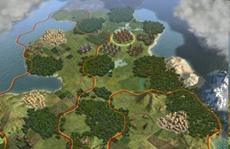Computer learns language by playing games
12 Jul 2011
Computers are great at treating words as data: Word-processing programs let you rearrange and format text however you like, and search engines can quickly find a word anywhere on the Web. But what would it mean for a computer to actually understand the meaning of a sentence written in ordinary English - or French, or Urdu, or Mandarin?
 |
| "Civilization" is a strategy game in which players build empires by, among other things, deciding where to found cities and deploy armies. Image courtesy of Sid Meier's Civilization V |
One test might be whether the computer could analyze and follow a set of instructions for an unfamiliar task. And indeed, in the last few years, researchers at MIT's Computer Science and Artificial Intelligence Lab have begun designing machine-learning systems that do exactly that, with surprisingly good results.
In 2009, at the annual meeting of the Association for Computational Linguistics (ACL), researchers in the lab of Regina Barzilay, associate professor of computer science and electrical engineering, took the best-paper award for a system that generated scripts for installing a piece of software on a Windows computer by reviewing instructions posted on Microsoft's help site. At this year's ACL meeting, Barzilay, her graduate student S. R. K. Branavan and David Silver of University College London applied a similar approach to a more complicated problem: learning to play ''Civilization,'' a computer game in which the player guides the development of a city into an empire across centuries of human history. When the researchers augmented a machine-learning system so that it could use a player's manual to guide the development of a game-playing strategy, its rate of victory jumped from 46 percent to 79 percent.
Starting from scratch
''Games are used as a test bed for artificial-intelligence techniques simply because of their complexity,'' says Branavan, who was first author on both ACL papers. ''Every action that you take in the game doesn't have a predetermined outcome, because the game or the opponent can randomly react to what you do. So you need a technique that can handle very complex scenarios that react in potentially random ways.''
Moreover, Barzilay says, game manuals have ''very open text. They don't tell you how to win. They just give you very general advice and suggestions, and you have to figure out a lot of other things on your own.'' Relative to an application like the software-installing program, Branavan explains, games are ''another step closer to the real world.''


















